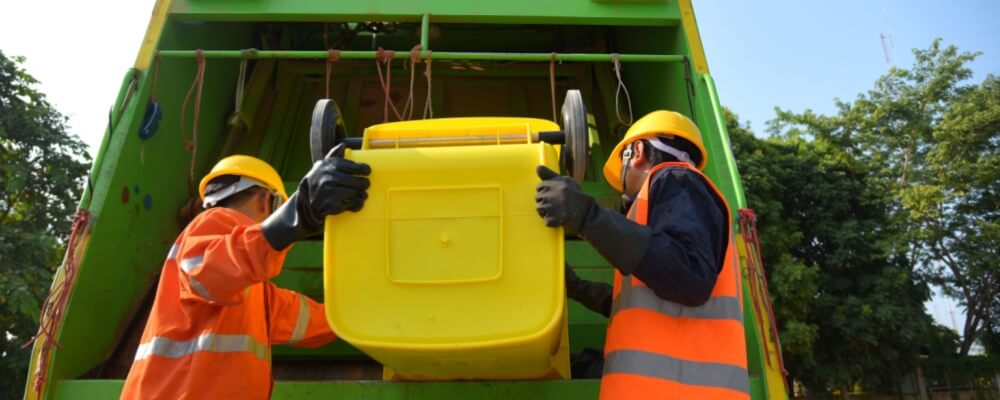Wheaton Workers' Compensation Lawyer for Garbage Handlers

Workers' Comp Attorney for Garbage Handlers Injured on the Job in Wheaton, IL
Garbage handlers play a critical role in keeping our communities clean and safe, yet their jobs come with significant risks. In Illinois, workers in this field face a variety of hazards that can lead to serious injuries. At the Law Offices of David W. Clark, P.C., we understand the risks garbage handlers experience daily. When these workers experience injuries on the job, they will need to understand the benefits available to them through workers' compensation.
Common Injuries Among Garbage Handlers
The nature of garbage handling work often exposes employees to dangerous conditions. Common injuries may include:
Musculoskeletal Disorders
Garbage handlers frequently engage in physically demanding tasks, including lifting heavy bins and repetitive bending. This can lead to:
- Back injuries - Strains and sprains of the lower back are prevalent due to the heavy lifting and twisting movements involved in waste collection.
- Joint injuries - Knees, shoulders, and wrists can suffer from overuse or improper lifting techniques, leading to chronic pain and limitations in mobility.
Cuts and Lacerations
Handling sharp objects within garbage bags or containers can result in:
- Severe cuts - Glass, metal, and other sharp debris can cause deep lacerations, which may require stitches and medical attention.
- Puncture wounds - Garbage handlers may accidentally puncture their skin when dealing with broken or jagged items.
- Infections - Due to the unsanitary conditions garbage handlers are exposed to, wounds may become infected, leading to additional medical complications.
Slip and Fall Injuries
The work environment can be hazardous, with spills, uneven surfaces, and inclement weather contributing to:
- Fractures - Slips and falls can lead to broken bones, particularly in the wrists, arms, and legs.
- Sprains and strains - Even minor falls can result in significant sprains, especially if workers instinctively try to catch themselves.
Respiratory Issues
Garbage handlers are often exposed to chemical fumes and dust. Over time, this can lead to:
- Chronic respiratory conditions - Prolonged exposure to hazardous materials or fumes can result in chronic bronchitis or other respiratory ailments.
- Allergic reactions - Dust, mold, and chemicals common in waste can trigger severe allergic reactions, impacting workers' ability to perform their duties.
Heat Exhaustion and Dehydration
Given the physical nature of the job and the environmental conditions during different times of the year, garbage handlers are at risk of:
- Heat exhaustion - Prolonged exposure to high temperatures without proper hydration can lead to fatigue, dizziness, and, in severe cases, heatstroke.
- Dehydration - Not drinking enough water while engaging in strenuous activities can impair a worker's performance and health.
Workers' Compensation Benefits for Garbage Handling Injuries
In the event of an injury, garbage handlers in Illinois are entitled to various benefits under the state's workers' compensation system. Some of the key benefits include:
Medical Benefits
Covered medical expenses often include:
- Emergency medical care - Immediate treatment for injuries sustained on the job.
- Rehabilitation costs - Physical therapy, occupational therapy, and any necessary follow-up visits.
Wage Loss Benefits
If an injury prevents a garbage handler from working for more than three days, they may be eligible for disability benefits, which cover:
- Temporary total disability - Compensation addressing the inability to work during recovery.
- Temporary partial disability - Benefits for workers who can return to work in a limited capacity, addressing the difference between what they are currently able to earn and their regular wages.
Permanent Disability Benefits
In cases involving long-term impairment, garbage handlers may qualify for benefits including:
- Permanent partial disability - Financial compensation for impairments that do not fully incapacitate the worker, usually providing a certain number of weeks of pay based on the body part affected.
- Permanent total disability - Ongoing benefits for a person who can no longer work in any capacity due to their injuries.
Vocational Rehabilitation
If injuries result in an inability to perform previous job duties, workers may receive benefits to help them find work, including:
- Job placement assistance - Help finding suitable employment in a different field.
- Retraining programs - Funding for education or training in new skills to ensure that a person can return to work.
Contact Our Wheaton, Illinois Workers' Compensation Attorney for Sanitation Workers
Garbage handlers in Illinois face many risks every day, and there are multiple types of injuries that can occur on the job. It is essential for workers to understand their rights and the benefits available to them under workers' compensation laws. At the Law Offices of David W. Clark, P.C., we help injured workers navigate this complex system and fight for the benefits they deserve. If you have been injured on the job, contact our office by calling 630-665-5678 and schedule a free consultation today.
WE DON'T GET PAID UNTIL YOU DO!
Free Initial Consultation
630-665-5678
Our attorneys aggressively pursue every avenue to ensure that you are properly compensated for your pain and suffering, medical costs, or lost wages as soon as possible. You pay nothing until you receive the judgment or settlement you deserve.











